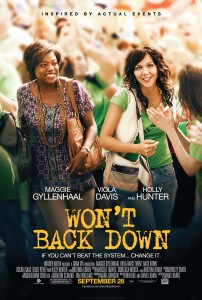Why Talking About 'Won't Back Down' Is Important, Even If You Dislike The Film

Photo courtesy of Walden Media
'Won't Back Down,' a movie about parent trigger laws, is in theaters Sept. 28.
The events in “Won’t Back Down” might be based on an entirely fictional Pennsylvania law, but the movie is generating very real response about the parent trigger and big policy questions about how to fix failing schools.
Earlier this month we noted that both Tampa and Charlotte hosted screenings of the film during the Republican and Democratic national conventions. This morning we linked out to Andrew J. Rotherham’s review in TIME. “Won’t Back Down” doesn’t exactly clear the bar for date night, he writes, but perhaps it’s even more surprising that education overhaul is the topic of a Friday night flick at all:
Given how contentious education reform is, there are certainly safer roles for Maggie Gyllenhaal, a hip actress on her way up, than playing a mom going head to head with the local teachers union. The film’s New York premier was picketed by protesters on Sunday, and the national teachers unions are furiously seeking to discredit it. (Talking point No. 1: one of the film’s production companies, Walden Media, is owned by conservative billionaire Philip Anschutz.)
Rotherham writes that the stars of “Won’t Back Down” haven’t shied away from criticism that the film is just a propaganda piece. Viola Davis appeared earlier this week on Today to talk about how education can help fix the cycle of poverty. Certainly the plight of kids trapped in failing schools is more heartbreaking than anything Hollywood could cook up, Rotherham concludes.
“Won’t Back Down” isn’t a documentary, unlike the other education film Walden Studios released in 2010. The comparisons to “Waiting For Superman” are frequent, but the reactions are very different. From Education Week:
Reviewers were mostly favorable towards “Waiting For Superman.” The web site Rotten Tomatoes aggregates reviews, and also collects feedback from ordinary folks who have seen the movies. “Waiting For Superman” got an overall rating of 89%, with an audience score that was 84% positive.Flash forward two years, and witness the release this month of “Won’t Back Down,” another movie heavily financed and promoted by education “reformers,” with a similar message that teacher unions are obstacles to school improvement. This time the reaction has been decidedly different. The Rotten Tomatoes site indicates a reviewer score of only 35% so far, in spite of efforts bystaffers at Students First to boost the score.
So here’s where it gets tricky: “Won’t Back Down” isn’t based on a true story. But that doesn’t mean audiences don’t look for characters they know on screen. From NPR:
Mary Thompson Powell and her husband, Daryl, have two children in a charter school. They were turned off by the way the movie treated teachers and unions.
“You know, I think some of the portrayal of the teachers at Adams … it disturbed me,” Mary says.
“I thought they did some things with the union that was a little bit like, ‘Did you really need to go there?’ ” Daryl says.
Writing for Education Next, Andrew Kelly says “Won’t Back Down” does a good job of portraying the tension between unions and individual teachers. But he says the film fails to provide audiences with an accurate understanding of the parent trigger laws that actually exist:
In the Hollywood version, a successful petition requires not only a majority of parents, but a majority of teachers as well. This change allows director Daniel Barnz—who describes himself as “extremely pro-union”—to place teachers at the center of the reform effort.
But in the rough-and-tumble world of education politics, requiring teacher buy-in would effectively negate the parent trigger. Teachers would hold veto power over parents, and union threats could keep risk-averse teachers in line. Such a provision would so sabotage the parent trigger that the California Teachers Association tried (without success) to write such a “poison pill” provision into the California law.
And that brings us to the fact that no parent group has succeeded in pulling the trigger yet. From Live Long and Prosper:
There hasn’t been a parent trigger-based transfer of a school from public control to corporate charter control. There shouldn’t be either, because, as much as “reformers” may want you to believe it, parents don’t own public schools. The public owns public schools and a group of citizens, no matter how involved they are in a public institution, shouldn’t have the right to sell that institution to a private enterprise. A little league group, for example, can’t sell the public park in which they play simply because they use the park. I believe parents should be closely involved in their children’s education, but that’s not what the parent trigger laws provide for.
The last time we wrote about “Won’t Back Down,” a commenter posted a link out to Parents Across America, one of the groups mobilizing against the film. (Full disclosure: Neither of us have seen the movie yet, but since everyone’s talking about it, we probably will.) But even if you have no intention of hitting the theater this weekend, is the conversation “Won’t Back Down” has started still important to have?

